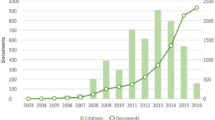Abstract
Sentiment analysis is a set of techniques that deal with the verification of sentiment and emotions in written texts. This introductory work aims to explore the combination of scores and polarities of sentiments (positive, neutral and negative) provided by different sentiment analysis tools. The goal is to generate a final score and its respective polarity from the normalization and arithmetic average scores given by those tools that provide a minimum of reliability. The texts analyzed to test our hypotheses were obtained from forum posts from participants in a massive open online course (MOOC) offered by Universidade Aberta de Portugal, and were submitted to four online service APIs offering sentiment analysis: Amazon Comprehend, Google Natural Language, IBM Watson Natural Language Understanding, and Microsoft Text Analytics. The initial results are encouraging, suggesting that the average score is a valid way to increase the accuracy of the predictions from different sentiment analyzers.
Access this chapter
Tax calculation will be finalised at checkout
Purchases are for personal use only
Similar content being viewed by others
References
Adamopoulos, P.: What makes a great MOOC? An interdisciplinary analysis of student retention in online courses. In: Proceedings of the 34th International Conference on Information Systems, ICIS, vol. 2013, Milan, Italy (2013)
Amazon Web Services, Inc. Amazon Comprehend - Developer Guide (2019). https://docs.aws.amazon.com/comprehend/latest/dg/comprehend-dg.pdf
Benevenuto, F., Ribeiro, F., Araújo, M.: Métodos para Análise de Sentimentos em mídias sociais. In: Brazilian Symposium on Multimedia and the Web. (Webmedia), Manaus, Brazil, p. 30 (2015). (in Portuguese)
Breiman, L.: Bagging predictors. Mach. Learn. 24(2), 123–140 (1996)
Dale, R.: Text analytics APIs, Part 1: The bigger players. Nat. Lang. Eng. 24(02), 317–324 (2018). https://doi.org/10.1017/S1351324918000013
Dietterich, T.G.: Ensemble methods in machine learning. In: Kittler, J., Roli, F. (eds.) MCS 2000. LNCS, vol. 1857, pp. 1–15. Springer, Heidelberg (2000). https://doi.org/10.1007/3-540-45014-9_1
Fei, H., Li, H.: The study of learners’ emotional analysis based on MOOC. In: Xiao, J., Mao, Z.-H., Suzumura, T., Zhang, L.-J. (eds.) ICCC 2018. LNCS, vol. 10971, pp. 170–178. Springer, Cham (2018). https://doi.org/10.1007/978-3-319-94307-7_14
Jaques, P. A., Viccari, R. M.: Considering student’s emotions in computer-mediated learning environments. In: Zongmin Ma. (Org.). Web-based Intelligent e-Learning Systems: Technologies and Applications. Information Science Publishing, Hershey 2006, pp. 122–138. IGI Global, Pennsylvania (2006). https://doi.org/10.4018/978-1-59140-729-4
Koutropoulos, A., et al.: Emotive vocabulary in MOOCs: context & participant retention. Eur. J. Open Distance E-Learn. (2012)
Liu, B.: Sentiment Analysis and Subjectivity. In: Handbook of Natural Language Processing 2nd(edn.) vol. 38 (2010)
Liu, B.: Sentiment analysis and opinion mining. Morgan & Claypool, San Rafael (2012)
Liu, Z., Zhang, W., Sun, J., Cheng, H. N. H., Peng, X., Liu, S.: Emotion and associated topic detection for course comments in a MOOC platform. In: 2016 International Conference on Educational Innovation through Technology (EITT), pp. 15–19. (2016). https://doi.org/10.1109/EITT.2016.11
Natural Language API Basics. https://cloud.google.com/natural-language/docs/basics
Pursel, B.K., Zhang, L., Jablokow, K.W., Choi, G.W., Velegol, D.: Understanding MOOC students: motivations and behaviours indicative of MOOC completion: MOOC student motivations and behaviors. J. Comput. Assist. Learn. 32(3), 202–217 (2016). https://doi.org/10.1111/jcal.12131
Robinson, C., Yeomans, M., Reich, J., Hulleman, C., Gehlbach, H.: Forecasting student achievement in MOOCs with natural language processing. In: Proceedings of the Sixth International Conference on Learning Analytics & Knowledge - LAK 2016, pp. 383–387. (2016). https://doi.org/10.1145/2883851.2883932
Sentiment analysis using the Text Analytics from Azure Cognitive Services - Microsoft Docs. https://docs.microsoft.com/en-us/azure/cognitive-services/text-analytics/how-tos/text-analytics-how-to-sentiment-analysis
Tsytsarau, M., Palpanas, T.: Survey on mining subjective data on the web. Data Min. Knowl. Disc. 24(3), 478–514 (2012). https://doi.org/10.1007/s10618-011-0238-6
Tucker, C., Pursel, B.K., Divinsky, A.: Mining student-generated textual data in MOOCs and quantifying their effects on student performance and learning outcomes. Comput. Educ. J. 5(4), 84–95 (2014)
Vergara, S., El-Khouly, M., Tantawi, M., Shireesh, M., Sri, L.: Building Cognitive Applications with IBM Watson Services: Volume 7 Natural Language Understanding. (2017)
Wang, L., Hu, G., Zhou, T.: Semantic analysis of learners’ emotional tendencies on online MOOC education. Sustainability 10(6), 1921 (2018). https://doi.org/10.3390/su10061921
Wen, M., Yang, D., Rosé, C.P.: Sentiment analysis in MOOC discussion forums: what does it tell us. In: Proceedings of Educational Data Mining (2014)
Wong, J.-S., Pursel, B., Divinsky, A., Jansen, B.J.: An analysis of MOOC discussion forum interactions from the most active users. In: Agarwal, N., Xu, K., Osgood, N., (eds.) Social Computing, Behavioral-Cultural Modeling, and Prediction, vol. 9021, pp. 452–457 (2015) https://doi.org/10.1007/978-3-319-16268-3_58
Author information
Authors and Affiliations
Corresponding author
Editor information
Editors and Affiliations
Rights and permissions
Copyright information
© 2019 Springer Nature Switzerland AG
About this paper
Cite this paper
Pinto, H.L., Rocio, V. (2019). Combining Sentiment Analysis Scores to Improve Accuracy of Polarity Classification in MOOC Posts. In: Moura Oliveira, P., Novais, P., Reis, L. (eds) Progress in Artificial Intelligence. EPIA 2019. Lecture Notes in Computer Science(), vol 11804. Springer, Cham. https://doi.org/10.1007/978-3-030-30241-2_4
Download citation
DOI: https://doi.org/10.1007/978-3-030-30241-2_4
Published:
Publisher Name: Springer, Cham
Print ISBN: 978-3-030-30240-5
Online ISBN: 978-3-030-30241-2
eBook Packages: Computer ScienceComputer Science (R0)




